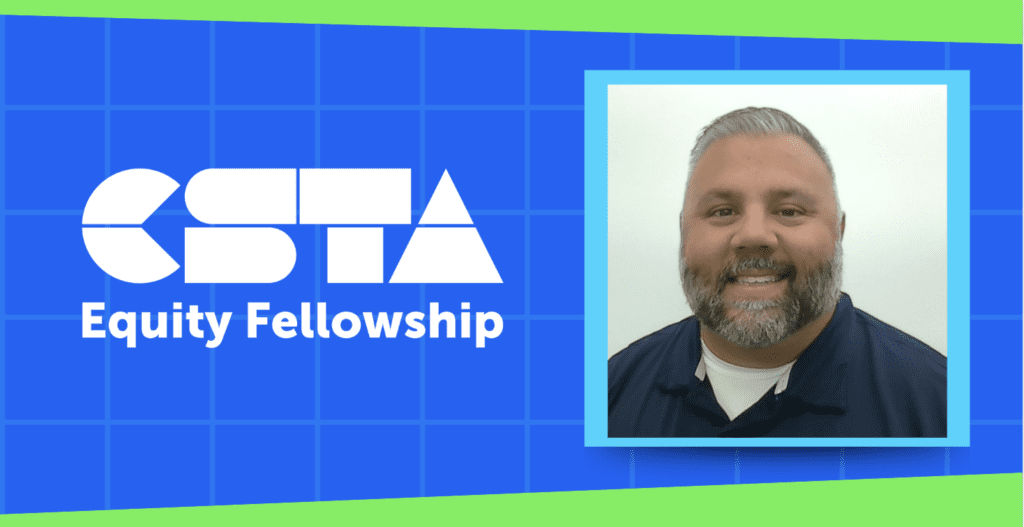Matt Alonzo has taught math and computer science at Parkway North High School in St. Louis, MO, for the last twenty years. In 2009, when Matt was asked to teach the single computer science class at his school, he quickly learned the value of computational thinking in helping students succeed. But despite the importance of these skills, most students didn’t have access to the class. Matt was determined to change that. Since that first year of teaching computer science, Matt has expanded the CS program to include four CS classes, a Computer Science Honors Society, and a schoolwide CS mini-conference. He has also supported the development of CS programs at the three other high schools in his district, and he is a facilitator for Code.org’s CS A and CS Principles curricula.
In that first year of teaching computer science, Matt was quick to notice that the students in his class were not representative of the overall demographics at his school, with girls and students of color dramatically underrepresented. He knew that changing those demographics would require thinking outside of the box. He started by seeking out ways to make CS fun, engaging, and approachable to his students, introducing devices like Sphero robots and CoDrones for students to code. They were a hit with the class, and Matt encouraged his students to program the robots in the school hallways, to generate interest and attention around the school.

Next, he turned to his colleagues in the math department for help. Together, they worked to identify students from underrepresented groups who might have an interest in computer science, and Matt actively recruited those students to join future CS classes. He also enlisted the aid of the school librarians to organize an Hour of Code and challenged teachers in his department to bring their students to the library to complete coding activities. “Although I didn’t reach my goal of having every student participate that first year,” Matt says, “the seed had been planted for something greater.”
Building on his initial successes, Matt helped organize a department-wide mini-conference in computer science in the 2019–20 school year. Over the course of this conference, math students got to participate in hands-on CS learning, each student completing at least two CS activities. Matt says, “This helped to break down the stereotype of what a CS student looks like and motivated students who were not typically interested in the subject to become leaders in the room.” It also further piqued his colleagues’ interest in incorporating CS topics into their math teaching.
Matt also works constantly to improve his own practice as a computer science educator. He’s involved in a professional learning community that allows CS teachers in his district to share best practices, discuss equity in CS education, and partner with regional tech companies to gain a better understanding of workplace needs. He is a facilitator for Code.org, as well as a participant on their advisory councils. Through these efforts, Matt has been able to expand and enhance his school’s CS offerings and build on his own commitment to equity in the field. His school’s CS program now consists of four classes (Intro to Computer Science, AP CS A, AP CS Principles, and Cybersecurity), and the demographics of the classes have become much more representative of the school as a whole.
In his time as a CSTA Equity Fellow, Matt hopes to continue learning new strategies to promote equity in CS. As a school board member in his home district, he is especially well positioned to incorporate those strategies, not just in his own teaching practice, but throughout his entire school district. “Since I consider myself to be a lifelong learner,” Matt says, “I relish any opportunity to expand my understanding of equity and inclusion in CS education.”
Matt knows that one of the best ways to introduce CS concepts is to incorporate them across multiple disciplines, and he’s had great success working with his colleagues in the math department to brainstorm ways of doing that. But he wants to reach far beyond math. He hopes to collaborate with members of his cohort who teach in other disciplines to develop CS activities that integrate seamlessly across multiple core subject areas. He also hopes to work on expanding his CS mini-conference, which has seen great success in introducing high school students to computer science, to middle and elementary schools.
Matt’s career as a computer science teacher has required him to continually reassess his practice, build on what works, and find new ways to reach students and grow as an educator. He’s thrilled to have the opportunity to do all of those things in the company of his cohort of CSTA Equity Fellows.

